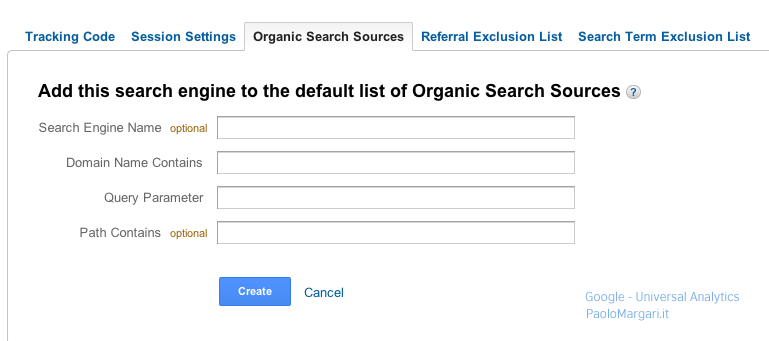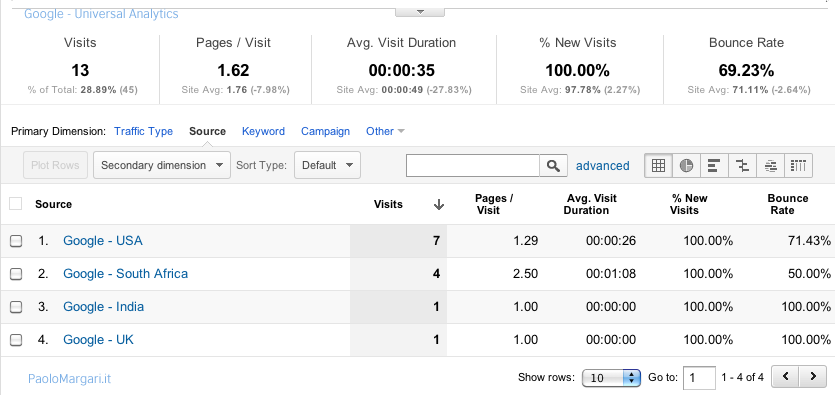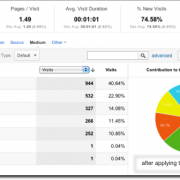How to track each Google country search engine on Universal Analytics
Have you tested Universal Analytics by Google? If you haven’t (yet), just create a new free GA profile and you will now have the option to choose between the old and the new route – which not surprisingly is still in beta.
You will not see big differences on the User Interface, but some changes are in the Admin section and are related to the wider flexibility in terms of customisation that such new system allows, including multi-platform tracking. I am not going to list the new features, you can find them here, and you can even watch a brief showcasing video at the end of this post.
I just want to focus on an interesting finding that happened by chance (let’s say so…) Among the other things that differentiate it from “traditional” GA, you can set up as much search engines as you want. There’s already a list with the main search engine available – it obviously includes also all Google search engines and they will appear, as usual, under one single voice “google”.
Let’s say that your friend has just launched the new Google enemy (!) and you want to treat it as organic rather than a classic referral: you have to add it using the following simple form located on:
Admin – Account – Tracking Info – Organic Search sources – Add Search Engine

How to add a search engine on Universal Analytics
How to add a search engine on Universal Analytics
Now, despite Google is already in the predefined UA list, why not configure a few single-country search engines, just to test? Of course, your site should be indexed there and you should run some test (and wait a bit for statistics to show up in reports). Don’t be impatient: sow your seeds as follows and wait…

How to set up Google country engines on Universal Analytics
Now that you have set up all accounts and waited for data on the Sources reports, have a look at this!

What you find on Universal Analytics: not just one single “google” anymore
What you find on Universal Analytics: not just one single “google” anymore
Interesting, isn’t it?
Now, why don’t you get a bit deeper trying to track also visits from single Google bits like Images or Maps? I haven’t tested it fully yet, but you can try either using a domain like images.google.com or just google.com and another word on the optional path field, just like this:
How to set up Google maps and images engines on Universal Analytics
This system is still far from tracking local searches as it should, but if you will be able to distinguish between pure organic and maps, you can certainly enrich your reports with meaningful metrics. And what about finding out data only for images? Such data are highly relevant for photobloggers, but also for news/magazines/blogzines/etc.
Unfortunately you cannot upload all Google “search products” in bulk so if your plan is to add them all… good luck! Differently, why not adding just a few relevant for your business? All the others will still appear under the same old “google” category so you are not going to miss anything.
A solution for Not-Provided keywords …or at least a little cure?
A final consideration to add concerns the sadly famous “not provided” keywords affair: I’ve added two different GA tracking codes onto the same site – ok it’s not the best practice suggested but this way it still works and allows checking differences between two different ways of measuring things.
Starting from October 2011, Google has increased encrypting search queries so you end up by not knowing anymore about 30% (or more) of search queries that brought visits to your site. Official reason is privacy, such as protecting users logged in with their Google account – it might be for privacy but also for a future possible strategy to sell relevant, precious information for SEO and marketing people.
There are some solutions to understand what’s hidden behind the “not provided” variable, here’s a popular hack proposed by Dan Baker on eConsultancy. I’ve tested it, it’s very helpful but unfortunately not resolutive.
In my recent test, the “old” GA shows about 30% of not-provided keywords (it’s more or less the recent standard that wiped the smile off SEO-people’s faces), whilst (apparently good news) UA shows just 5% of not-provided on average. On a website, for a local search engine set up on the admin panel as shown above, I still haven’t seen any “not-provided” kw! Is that my (wrong) impression or a subtle Google strategy to move people from the “old” GA to UA?
Update: that was my wrong impression: few data don’t bring good assumptions. In fact the problem of not-provided kw’s remains unsolved (it would have been too easy/revolutionary)
Now, if you (still) haven’t heard of UA, this video gives an idea of its capabilities.
Or if you fancy caffeine…










I’m seeing the same levels of “not provided” in Universal Analytics as in GA. Is it possible the results you are seeing are more to do with your configuration of search engines? Have you tried dissecting search terms by search engine to see if there’s a difference?
Hi Tony, sorry for a late reply but I’ve been wait for more data.
My findings are as follows:
1) if I do not configure country search engines (well, I’m talking about Google because I don’t have relevant data for other SE) the “not provided” does not change
2) if I set up country search engines as shown in the post, the “not provided” kw’s disappear from the list and organic searches are just the ones coming with a revealed keyword and assigned to a country search engine. this way there are less visits, since all “not provided” are excluded from stats.
therefore I don’t suggest adding customised country Google as tested in the post, because such configuration will reduce total visits and, as a consequence, a lot of relevant information related to searches that bring “not provided” would be missing from stats.